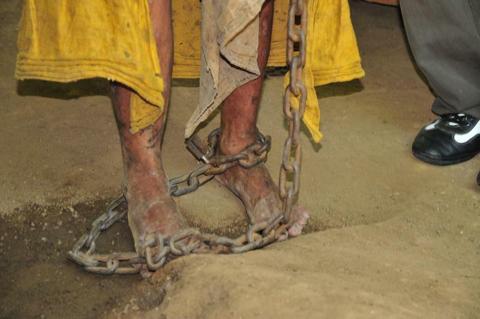A handsome man smiling out from his wedding pictures, it is easy to see how Komang was able to keep his history of mental health problems a secret from his new wife for so long.
But the shock of seeing the 34-year-old’s psychiatrist as a guest of honour at their marriage ceremony in picturesque north-east Bali must have paled into insignificance for his bride when paired with the revelation that her husband-to-be had been living locked in a cage with his brother for the past eight years.
The Indonesian farmer and his brother, Gedenut, 38, had been shackled 24 hours a day by their own family, trapped in a cage in the jungle a short distance from their remote home. The siblings’ father built the wooden bars for them himself after villagers complained they could not cope with the pair’s undiagnosed schizophrenia.
Unable to control the siblings from running riot when unwell, the community decided to keep them caged. Trapped in an enclosure so small they were barely able to turn around, visitors brought them food and water and washed them – but no-one could offer them treatment, much less a cure.
“The neighbours asked the family to look after them because they were making a disturbance,” explained Professor Luh Ketut Suryani, the Balinese psychiatrist whose team discovered and rescued the pair.
“These families are poor – they don’t have enough money to go to the doctor. So they got the idea to restrict the patients,” she said.
“If you have a mental health disorder in Bali don’t hope that someone will help you. “They will leave you the way you are and if you die it is even better for them than seeing you still alive. That is what’s happening to these people.”

Far from popular tourist havens like Kuta and Denpasar, the director and founder of the island’s Suryani Institute of Mental Health has been slowly unveiling the plight of many people with mental illness in the remote jungle villages.
The former head of of Psychiatry at Bali’s Udayana University said her fellow islanders’ secret shame was unknown even to mental health professionals like her until a year ago.
Now, a ten-month study by her volunteers in the north-east of the island has revealed more than 800 people with untreated mental health problems – and a damning 52 people discovered living in chains.
The psychiatrist was devastated to uncover the cruel conditions suffered by so many on the island whose natural beauty and culture has seen it viewed a natural paradise – the jewel in the Indonesian archipelago’s crown.
Professor Suryani’s concerns about a rising suicide rate following the terrorist bombings on the island in 2002 and 2005 initially spurred her to survey an area containing half a million of the island’s population.
Based on the untreated cases uncovered in one remote pocket of the island – she now estimates there may be thousands suffering from undiagnosed mental disorders amoung Bali’s three million citizens – with the horrifying possibility of scores of others locked in cages or shackled in chains.
A short YouTube documentary made by the Suryani Institute last August showed some of the patients Professor Suryani’s team have been offering free medical treatment and counselling.
One chained woman stares vacantly into space chanting meaningless rhymes, another is nicknamed “crazy mother” by her family.
“In a sense they are cursing her to be insane, leave her untreated and make fun of her,” Professor Suryani explains.
“We found another woman living in a shed. I was told she was paralysed, however, after examining her I realised she wasn’t. She couldn’t walk because her muscles had become atrophic.
“Some families keep the patients far away from the village in an isolated place, some are tied up nearby – the neighbours don’t care as long as they don’t cause any trouble.”
In addition to Suryani’s treatment, some patients now have help from Bangli Mental Hospital – the island’s only institution of its kind, catering for 340 patients at a time.
But most Balinese Hindus turn first to spiritual healers, favouring exorcism rituals over medical treatment for non-physical complaints.
A 2006 study found 47 of 54 patients eventually seeking treatment at Bangli Mental Hospital had visited a spiritual healer first.
Researchers from Japan’s Keio University discovered sufferers of illnesses including schizophrenia, delusional and neurotic disorders often postponed medical treatment as healers, called Balians, exorcised them with holy water and mantras to rid them of evil spirits.
One of the study’s authors, Toshiyuki Kurihara, reported: “Clinical treatment can often be written off because Balinese see mental illness as a spiritual disease.
“Families will examine their own religious practices to cure a person before even thinking of seeking medical help.”
Dr Niko Tiliopoulos, who helped make the Suryani Institute documentary, said even Balinese GPs often did not understand mental illness.
The psychology lecturer at Sydney University said: “The whole mental health system needs revised, and there needs to be enough money for treatments and salaries for trained professionals to help.
“People need to be educated at every level – GPs, university students, and the families of people with mental health problems.”
Since her discovery, Professor Suryani has successfully treated many patients with western treatments. But with one course of medication costing around $1,000 – higher than an annual salary for most Balinese – she is struggling to fund her work. She said: “When we first found people in the villages I was so shocked – I did not think my people could do a thing like that.
“They restrict the patient because they view them as hopeless, but of the 52 we have found, 40 are released and living in the community.
“Komang was ill for 16 years and spent eight years in a cage. We diagnosed him with schizophrenia, and after one year of medical treatment and counseling, he was well enough to get married.
“I feel compelled to help – we must survey the whole island and offer free medication so that they can feel how beautiful life is again.”
For more information visit www.guardian.co.uk


Comments are closed.